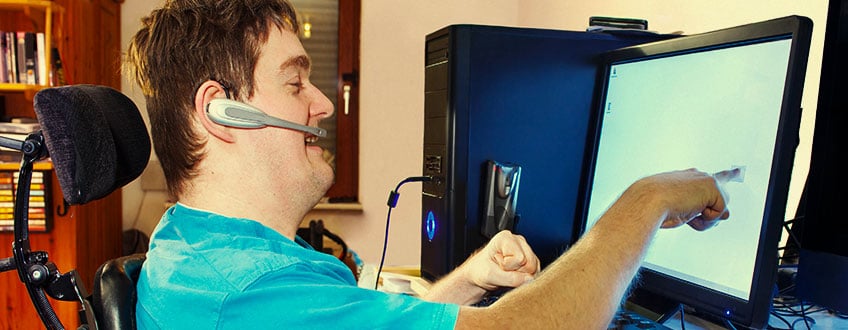.

Is Cannabis Safe For People With Disabilities?
Research reveals that cannabis may be even more interconnected with people living with disabilities than with the rest of the population. Some are thought to suffer from chronic endocannabinoid deficiencies due to genetic flaws. Find out through the latest research how cannabis may play a role.
Is cannabis able to assist people with disabilities? After all, they have an endocannabinoid system, just like every other human on Earth. Medical marijuana is currently being studied for its effectiveness in treating children with challenging epilepsy episodes, as seen in cases such as Charlotte Figi[1], when other options have proven less effective.
Researchers are now looking into how this potential element could improve the quality of life for people with all kinds of disabilities including autism, Down syndrome, cerebral palsy, and more. Here's what they're finding.
CANNABIS AND DOWN SYNDROME
Down syndrome affects 1 out of every 700 to 1,000 people. That doesn't sound like a lot, but almost everyone knows someone who has it. Intellectual disabilities, including memory impairment and learning deficits, are the most troublesome symptoms of Down. Could cannabis assist?
The theory is that people with Down syndrome not only have too many CB1 receptors in the hippocampus, but that they are also overactive. This in turn damages the connecting neurons, and that leads to cognitive impairment. To prove their theory, scientists tested[2] the memory of mice with the mouse version of Down syndrome before and after down-regulating their CB1 activity. Their memory seemed to show marked improvements after treatment.
Post-mortem studies show that brains donated by those who suffered from Down syndrome have the same plaques associated with Alzheimer's. Those plaques are thought to be related to excess CB2 receptors and fatty acid amide hydrolase (FAAH).
High levels of FAAH may suggest a chronically starved endocannabinoid system. In theory, supplementation with low doses of cannabis may be able to keep the CB1 and CB2 receptors busy, and maybe protect neurons, break down plaques in the brain, and reduce excess FAAH levels. More research, especially in human subjects, is needed.

CANNABIS AND AUTISM
Autism is even more prevalent than Down syndrome, affecting about 1 in 100 children. Although most people with autism are very intelligent, they are held back by their inability to connect with other people or understand social norms. As a result, both children and adults with autism can experience levels of hostility or anxiety that are not only hard to live with, but drive other people away, feeding an endless circle of social isolation.
To complicate matters, autism is a spectrum disorder. That means that symptoms and treatments vary widely, and what works for one person won't necessarily work for another.
Some experts nowadays think that autism might be caused by a genetic mutation that drives chronically low levels of natural endocannabinoids in the human brain. It may also disrupt the normal way the brain interacts with those chemicals.
Because the THC and CBD found in cannabis share a similar structure with the cannabinoids the body creates naturally, studies are targetting those elements as potential supplements. In fact, the Autism Research Institute is giving small, safe doses of cannabis to people with autism in a controlled setting. In many, but not all, study participants, a significant decrease in anxiety, hostility, and self-destructive behaviour was observed.
According to at least one anecdote, the improvement is not because these patients simply got high and mellowed out. In 2008, the father of an autistic child in California went public with his story about how he managed his son's rage and mood swings with raw cannabis after countless pharmaceuticals couldn't help.
Apparently, he gave his son concentrated THCA from juiced, non-decarbed marijuana twice a day. This form of THC can't get people high. The results were positive. After his father, the boy behaved calmer and happier, he sought out physical affection where before he was often aggressive and combative.
CANNABIS AND MUSCULAR DYSTROPHY
Made famous by late comedian and actor Jerry Lewis, muscular dystrophy affects about 1 in every 5,000 people. It primarily affects boys as young as two years old, but adults can get it too. It involves a progressive weakening in the muscles that's accompanied by severe pain and involuntary muscle spasms. Like autism, this disorder varies from one patient to the next, and is thought to be caused by a genetic defect.
There is no cure for muscular dystrophy; until one is found, the goal of all treatment options is to reduce symptoms and control the progression of the disease where possible.
Cannabis is studied for its role in activating the CB1 and CB2 receptors in the human endocannabinoid system. The action is investigated for its relation with pain, including neuropathic pain, and muscle spasms.
CANNABIS AND CEREBRAL PALSY
Cerebral palsy is a group of neurological disorders that affect the patient's muscle tone, coordination, and ability to move. Symptoms vary, but this is a debilitating disease that usually progresses to the point where people who suffer from it lose their ability walk or care for themselves. Patients also experience seizures and chronic pain. About 3 in every 1,000 children have cerebral palsy.
Cannabis is being studied for its relation to seizures, muscle spasms, and pain, but it may also have one more asset for these individuals. Many people with cerebral palsy lose their ability to speak clearly as their disease progresses. They often stutter or have other speech impediments that make it difficult for them to communicate verbally with others.
So far, no official research studies on cannabis and speech problems have been conducted, but there are several anecdotal accounts, including Jacqueline Patterson's story as told in her documentary called In Pot We Trust, that reveal how cannabis may have affected it positively.

CANNABIS AND ALZHEIMER'S DISEASE
Alzheimer's is a scary disease. You never know who it will strike, or even when. Slowly, your brain deteriorates until you're no longer the person you once were. It's hard to say who it hurts more—the person who develops it, or the people who have to watch it steal their loved one away. Alzheimer's is not curable, and it's the biggest reason people become disabled when they get old. Worldwide, nearly 44 million people have this disease, and it's estimated that three times more than that are undiagnosed.
Research is still underway about how cannabis may be related to Alzheimer's disease prevention and developing symptoms. The buildup of amyloid plaques in the brain and the associated inflammation are thought to be the biggest contributing factors for developing this brain disease.
Ongoing studies are testing THC to see if the cannabinoid confers any protection[3] against the buildup of these troublesome proteins. But researchers aren’t stopping at this psychotropic cannabinoid. They’re also testing CBD for plaque-busting potential[4] in models of familial Alzheimer's disease.
SUMMARY
Cannabis may offer medical support in the future; however, more research is needed, as a long stretch is still necessary. Now that restrictions on research are being lifted, we could see this area of medicine advance faster. Hopefully, this will lead to more effective treatments that eliminate symptoms without troublesome side effects—if an outright cure for every condition can't be found.
If you or a loved one live with a disability and would like to see if cannabis could help, only do so if you're in an area where it's legal. If possible, seek advice from a medical doctor who has experience treating your specific condition with cannabis.
Medical DisclaimerInformation listed, referenced or linked to on this website is for general educational purposes only and does not provide professional medical or legal advice.
Royal Queen Seeds does not condone, advocate or promote licit or illicit drug use. Royal Queen Seeds Cannot be held responsible for material from references on our pages or on pages to which we provide links, which condone, advocate or promote licit or illicit drug use or illegal activities. Please consult your Doctor/Health care Practitioner before using any products/methods listed, referenced or linked to on this website.
- Marijuana stops child's severe seizures - CNN https://www.cnn.com
- https://www.sciencedirect.com/science/article/pii/S0969996118306855?via=ihub
- Tetrahydrocurcumin confers protection against amyloid β-indu... : NeuroReport https://journals.lww.com
- https://www.sciencedaily.com/releases/2021/03/210309192548.htm









































